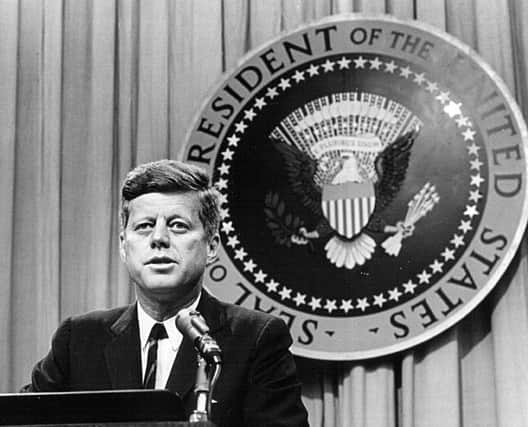Listen: Lost JFK speech brought to life by Edinburgh tech firm


Sound engineers were able to reproduce all 2,590 words from the 20-minute address, during which JFK discusses America’s standing in the world and the cost of maintaining its security, by stitching together audio from 831 previous speeches.
The whole process took Edinburgh-based speech synthesis firm CereProc eight weeks.
Advertisement
Hide AdAdvertisement
Hide AdCereProc’s lead voice engineer Chris Pidcock told Radio Scotland’s John Beattie programme yesterday how they analysed recording of hundreds of JFK’s speeches and split them into smaller “phonetic units” in a painstaking process. Innovative computer software was then used to turn the sounds into recognisable speech, recreating his oratorical style.
“We use machine learning and artificial intelligence techniques just to try and figure out how he moves his pitch and the duration of his sounds through his sentences,” Mr Piddock told the programme.
“That was a big part of the project because we didn’t want his intonation to be a boring and standard intonation.
“We took his existing speeches and material and we cut it up into tiny pieces and stitched it back together into a new speech.
Advertisement
Hide AdAdvertisement
Hide Ad“JFK had a really unique speaking style and getting his intonation correct was something that we had to spend some time on.”
JFK had been on his way to deliver the speech at the Dallas Trade Mart when he was shot and killed at 12:30pm on 22 November, 1963.
CereProc was commissioned to complete the JFK: Unsilenced project by Irish company Rothco in partnership with The Times newspaper.
Mr Piddock told the paper yesterday that the project had presented unique challenges.
Advertisement
Hide AdAdvertisement
Hide Ad“Because of the old analogue recording devices used, it appeared as if it was a different person speaking each time.
“Trying to harmonise the environment and manipulate the audio so that it ran together was quite difficult.”
In 2010, CereProc rebuilt the voice of renowned American film critic Roger Ebert, after surgery for thyroid cancer went wrong. After working with hours’ worth of recordings of Ebert’s film reviews, Cereproc created a prototype of his voice.
The technology is set to be used in future to help others losing their voices through illness or accident so that they could retain their own individual sound.